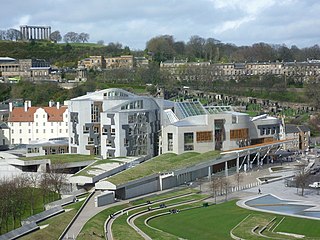
Devolution is the statutory delegation of powers from the central government of a sovereign state to govern at a subnational level, such as a regional or local level. It is a form of administrative decentralization. Devolved territories have the power to make legislation relevant to the area, thus granting them a higher level of autonomy.
Home rule is the government of a colony, dependent country, or region by its own citizens. It is thus the power of a part of a state or an external dependent country to exercise such of the state's powers of governance within its own administrative area that have been decentralized to it by the central government. Home rule may govern in an autonomous administrative division; in contrast, though, there is no sovereignty separate from that of the parent state, and thus no separate chief military command nor separate foreign policy and diplomacy.

Scottish independence is the idea of Scotland regaining its independence and once again becoming a sovereign state, independent from the United Kingdom. The term Scottish independence refers to the political movement that is campaigning to bring it about.

The Senedd, officially known as the Welsh Parliament in English and Senedd Cymru in Welsh, is the devolved, unicameral legislature of Wales. A democratically elected body, it makes laws for Wales, agrees to certain taxes, and scrutinises the Welsh Government. It is a bilingual institution, with both Welsh and English being the official languages of its business. From its creation in May 1999 until May 2020, the Senedd was officially known as the National Assembly for Wales and was often simply called the Welsh Assembly.

Politics of England forms the major part of the wider politics of the United Kingdom, with England being more populous than all the other countries of the United Kingdom put together. As England is also by far the largest in terms of area and GDP, its relationship to the UK is somewhat different from that of Scotland, Wales or Northern Ireland. The English capital London is also the capital of the UK, and English is the dominant language of the UK. Dicey and Morris (p26) list the separate states in the British Islands. "England, Scotland, Northern Ireland, the Isle of Man, Jersey, Guernsey, Alderney, and Sark.... is a separate country in the sense of the conflict of laws, though not one of them is a State known to public international law." But this may be varied by statute.

The Scottish Assembly was a proposed legislature for Scotland that would have devolved a set list of powers from the Parliament of the United Kingdom. The Labour Government led the Scotland Act 1978 through Westminster which provided for the establishment of the Scottish Assembly.

The Scottish Covenant was a petition to the United Kingdom government to create a home rule Scottish parliament. First proposed in 1930, and promoted by the Scots Independent in 1939, the National Covenant movement reached its peak during the late 1940s and early 1950s. Initiated by John MacCormick, the Covenant was written in October 1949 at the Church of Scotland Assembly Halls in Edinburgh, during the Third National Assembly of the Scottish Convention, a pressure group which evolved into the Scottish Covenant Association.

Referendums in the United Kingdom are occasionally held at a national, regional or local level. Historically, national referendums are rare due to the long-standing principle of parliamentary sovereignty. Legally there is no constitutional requirement to hold a national referendum for any purpose or on any issue. However, the UK Parliament is free to legislate through an Act of Parliament for a referendum to be held on any question at any time.

The Scottish devolution referendum of 1997 was a pre-legislative referendum held in Scotland on 11 September 1997 over whether there was support for the creation of a Scottish Parliament with devolved powers, and whether the Parliament should have tax-varying powers. The result was "Yes–Yes": a majority voted in favour of both proposals, and the Parliament was established following an election in 1999. Turnout for the referendum was 60.4%.

A post-legislative referendum was held in Scotland in 1979 to decide whether there was a sufficient support for a Scottish Assembly proposed in the Scotland Act 1978 among the Scottish electorate. This was an act to create a devolved deliberative assembly for Scotland. A majority (51.6%) of voters supported the proposal, but an amendment to the Act stipulated that it would be repealed if less than 40% of the total electorate voted in favour. As there was a turnout of 64% the "Yes" vote represented only 32.9% of the registered electorate, and the act was subsequently repealed.

Unionism in Scotland is a political movement which favours the continuation of the political union between Scotland and the other countries of the United Kingdom, and hence is opposed to Scottish independence. Scotland is one of four countries of the United Kingdom which has its own devolved government and Scottish Parliament, as well as representation in the UK Parliament. There are many strands of political Unionism in Scotland, some of which have ties to Unionism and Loyalism in Northern Ireland. The two main political parties in the UK — the Conservatives and Labour — both support Scotland remaining part of the UK.

The 1979 Welsh devolution referendum was a post-legislative referendum held on 1 March 1979 to decide whether there was sufficient support for a Welsh Assembly among the Welsh electorate. The referendum was held under the terms of the Wales Act 1978 drawn up to implement proposals made by the Kilbrandon Report published in 1973.

The Scotland Act 1978 was an act of the Parliament of the United Kingdom intended to establish a Scottish Assembly as a devolved legislature for Scotland. At a referendum held in the following year, the Act failed to gain the necessary level of approval required by an amendment, and was never put into effect.
The Royal Commission on the Constitution, also referred to as the Kilbrandon Commission or Kilbrandon Report, was a long-running royal commission set up by Harold Wilson's Labour government to examine the structures of the constitution of the United Kingdom and the British Islands and the government of its constituent countries, and to consider whether any changes should be made to those structures. It was started under Lord Crowther on 15 April 1969, Lord Kilbrandon took over in 1972, and it finally reported on 31 October 1973.

James Duncan Gordon Davidson was a British Liberal politician and farmer. He served as Member of Parliament for Aberdeenshire West from 1966 to 1970, when he chose not to stand again because of a family illness.

Scottish devolution is the process of the UK Parliament granting powers to the devolved Scottish Parliament. Prior to the advent of devolution, some had argued for a Scottish Parliament within the United Kingdom – while others have since advocated for complete independence. The people of Scotland first got the opportunity to vote in a referendum on proposals for devolution in 1979 and, although a majority of those voting voted 'Yes', the referendum legislation also required 40% of the electorate to vote 'Yes' for the plans to be enacted and this was not achieved. A second referendum opportunity in 1997, this time on a strong proposal, resulted in an overwhelming 'Yes' victory, leading to the Scotland Act 1998 being passed and the Scottish Parliament being established in 1999.

In the United Kingdom, devolution is the Parliament of the United Kingdom's statutory granting of a greater level of self-government to the Scottish Parliament, the Senedd, the Northern Ireland Assembly and the London Assembly and to their associated executive bodies: the Scottish Government, the Welsh Government, the Northern Ireland Executive and in England, the Greater London Authority and combined authorities.

The island groups of Orkney, Shetland and the Western Isles are all currently regions of Scotland. Their constitutional status has periodically been discussed, for example during the Scottish independence referendum campaign. Currently, they are council areas with the same constitutional status as the other 29 local government areas. The three island councils are the only local authorities among the 32 in the country where independent councillors form a majority.

The Scotland Act 2016 is an act of the Parliament of the United Kingdom. It sets out amendments to the Scotland Act 1998 and devolves further powers to Scotland. The legislation is based on recommendations given by the report of the Smith Commission, which was established on 19 September 2014 in the wake of the Scottish independence referendum.

Federalism in the United Kingdom aims at constitutional reform to achieve a federal UK or a British federation, where there is a division of legislative powers between two or more levels of government, so that sovereignty is decentralised between a federal government and autonomous governments in a federal system.















